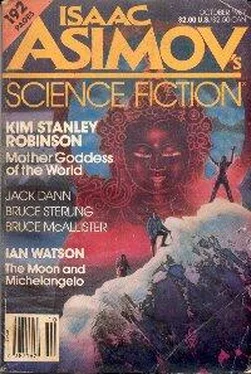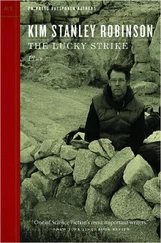Kim Robinson - Mother Goddess of the World
Здесь есть возможность читать онлайн «Kim Robinson - Mother Goddess of the World» весь текст электронной книги совершенно бесплатно (целиком полную версию без сокращений). В некоторых случаях можно слушать аудио, скачать через торрент в формате fb2 и присутствует краткое содержание. Год выпуска: 1987, Жанр: Фантастика и фэнтези, на английском языке. Описание произведения, (предисловие) а так же отзывы посетителей доступны на портале библиотеки ЛибКат.
- Название:Mother Goddess of the World
- Автор:
- Жанр:
- Год:1987
- ISBN:нет данных
- Рейтинг книги:5 / 5. Голосов: 1
-
Избранное:Добавить в избранное
- Отзывы:
-
Ваша оценка:
- 100
- 1
- 2
- 3
- 4
- 5
Mother Goddess of the World: краткое содержание, описание и аннотация
Предлагаем к чтению аннотацию, описание, краткое содержание или предисловие (зависит от того, что написал сам автор книги «Mother Goddess of the World»). Если вы не нашли необходимую информацию о книге — напишите в комментариях, мы постараемся отыскать её.
in Oct 1987. Later published as part of
collection (Tor Books, 1989).
Mother Goddess of the World — читать онлайн бесплатно полную книгу (весь текст) целиком
Ниже представлен текст книги, разбитый по страницам. Система сохранения места последней прочитанной страницы, позволяет с удобством читать онлайн бесплатно книгу «Mother Goddess of the World», без необходимости каждый раз заново искать на чём Вы остановились. Поставьте закладку, и сможете в любой момент перейти на страницу, на которой закончили чтение.
Интервал:
Закладка:
Mother Goddess of the World
by Kim Stanley Robinson
I
My life started to get weird again the night I ran into Freds Fredericks, near Chimoa, in the gorge of the Dudh Kosi. I was guiding a trek at the time, and was very happy to see Freds. He was traveling with another climber, a Tibetan by the name of Kunga Norbu, who appeared to speak little English except for “Hello” and “Good morning,” both of which he said to me as Freds introduced us, even though it was just after sunset. My trekking group was settled into their tents for the night, so Freds and Kunga and I headed for the cluster of teahouses tucked into the forest by the trail. We looked in them; two had been cleaned up for trekkers, and the third was a teahouse in the old style, frequented only by porters. We ducked into that one.
It was a single low room; we had to stoop not only under the beams that held up the slate roof, but also under the smoke layer. Old-style country buildings in Nepal do not have chimneys, and the smoke from their wood stoves just goes up to the roof and collects there in a very thick layer, which lowers until it begins to seep out under the eaves. Why the Nepalis don’t use chimneys, which I would have thought a fairly basic invention, is a question no one can answer; it is yet another Great Mystery of Nepal.
Five wooden tables were occupied by Rawang and Sherpa porters, sprawled on the benches. At one end of the room the stove was crackling away. Flames from the stove and a hissing Coleman lantern provided the light. We said Namaste to all the staring Nepalis, and ducked under the smoke to sit at the table nearest the stove, which was empty.
We let Kunga Norbu take care of the ordering, as he had more Nepalese than Freds or me. When he was done the Rawang stove keepers giggled and went to the stove, and came back with three huge cups of Tibetan tea.
I complained to Freds about this in no uncertain terms. “Damn it, I thought he was ordering chang!”
Tibetan tea, you see, is not your ordinary Lipton’s. To make it they start with a black liquid that is not made from tea leaves at all but from some kind of root, and it is so bitter you could use it for suturing. They pour a lot of salt into this brew, and stir it up, and then they dose it liberally with rancid yak butter, which melts and floats to the top.
It tastes worse than it sounds. I have developed a strategy for dealing with the stuff whenever I am offered a cup; I look out the nearest window, and water the plants with it. As long as I don’t do it too fast and get poured a second cup, I’m fine. But here I couldn’t do that, because twenty-odd pairs of laughing eyes were staring at us.
Kunga Norbu was hunched over the table, slurping from his cup and going “ooh,” and “ahh,” and saying complimentary things to the stove keepers. They nodded and looked closely at Freds and me, big grins on their faces.
Freds grabbed his cup and took a big gulp of the tea. He smacked his lips like a wine taster. “Right on,” he said, and drained the cup down. He held it up to our host. “More?” he said, pointing into the cup.
The porters howled. Our host refilled Freds’s cup and he slurped it down again, smacking his lips after every swallow. I slipped some iodine solution into mine from a dropper I keep on me, and stirred it around and held my nose to get down a sip, and they thought that was funny too.
So we were in tight with the teahouse crowd, and when I asked for chang they brought over a whole bucket of it. We poured it into the little chipped teahouse glasses and went to work on it.
“So what are you and Kunga Norbu up to?” I asked him.
“Well,” he said, and a funny expression crossed his face. “That’s kind of a long story, actually.”
“So tell it to me.”
He looked uncertain. “It’s too long to tell tonight.”
“What’s this? A story too long for Freds Fredericks to tell? Impossible, man, why I once heard you summarize the Bible to Laure, and it only took you a minute.”
Freds shook his head. “It’s longer than that.”
“I see.” I let it go, and the three of us kept on drinking the chang, which is a white beer made from rice or barley. We drank a lot of it, which is a dangerous proposition on several counts, but we didn’t care. As we drank we kept slumping lower over the table to try to get under the smoke layer, and besides we just naturally felt like slumping at that point. Eventually we were laid out like mud in a puddle.
Freds kept conferring with Kunga Norbu in Tibetan, and I got curious. “Freds, you hardly speak a word of Nepali, how is it you know so much Tibetan?”
“I spent a couple years in Tibet. I was studying in the Buddhist lamaseries there.”
“ You studied in Buddhist lamaseries in Tibet?”
“Yeah sure! Can’t you tell?”
“Well…” I waved a hand. “I guess that might explain it.”
“That was where I met Kunga Norbu, in fact. He was my teacher.”
“I thought he was a climbing buddy.”
“Oh he is! He’s a climbing lama. Actually there’s quite a number of them. See when the Chinese invaded Tibet they closed down all the lamaseries, destroyed most of them in fact. The monks had to go to work, and the lamas either slipped over to Nepal, or moved up into mountain caves. Then later the Chinese wanted to start climbing mountains as propaganda efforts, to show the rightness of the thoughts of Chairman Mao. The altitude in the Himalayas was a little bit much for them, though, so they mostly used Tibetans, and called them Chinese. And the Tibetans with the most actual mountain experience turned out to be Buddhist monks, who had spent a lot of time in really high, isolated retreats. Eight of the nine so-called Chinese to reach the top of Everest in 1975 were actually Tibetans.”
“Was Kunga Norbu one of them?”
“No. Although he wishes he was, let me tell you. But he did go pretty high on the North Ridge in the Chinese expedition of 1980. He’s a really strong climber. And a great guru too, a really holy guy.”
Kunga Norbu looked across the table at me, aware that we were talking about him. He was short and skinny, very tough looking, with long black hair. Like a lot of Tibetans, he looked almost exactly like a Navaho or Apache Indian. When he looked at me I got a funny feeling; it was as if he were staring right through me to infinity. Or somewhere equally distant. No doubt lamas cultivate that look.
“So what are you two doing up here?” I asked, a bit uncomfortable.
“We’re going to join my Brit buddies, and climb Lingtren. Should be great. And then Kunga and I might try a little something on our own.”
We found we had finished off the bucket of chang, and we ordered another. More of that and we became even lower than mud in a puddle.
Suddenly Kunga Norbu spoke to Freds, gesturing at me. “Really?” Freds said, and they talked some more. Finally Freds turned to me. “Well, this is a pretty big honor, George. Kunga wants me to tell you who he really is.”
“Very nice of him,” I said. I found that with my chin on the table I had to move my whole head to speak.
Freds lowered his voice, which seemed to me unnecessary as we were the only two people in the room who spoke English. “Do you know what a tulku is, George?”
“I think so,” I said. “Some of the Buddhist lamas up here are supposed to be reincarnated from earlier lamas, and they’re called tulkus, right? The abbot at Tengboche is supposed to be one.”
Freds nodded. “That’s right.” He patted Kunga Norbu on the shoulder. “Well, Kunga here is also a tulku.”
“I see.” I considered the etiquette of such a situation, but couldn’t really figure it, so finally I just scraped my chin off the table and stuck my hand across the table. Kunga Norbu took it and shook, with a modest smile.
Читать дальшеИнтервал:
Закладка:
Похожие книги на «Mother Goddess of the World»
Представляем Вашему вниманию похожие книги на «Mother Goddess of the World» списком для выбора. Мы отобрали схожую по названию и смыслу литературу в надежде предоставить читателям больше вариантов отыскать новые, интересные, ещё непрочитанные произведения.
Обсуждение, отзывы о книге «Mother Goddess of the World» и просто собственные мнения читателей. Оставьте ваши комментарии, напишите, что Вы думаете о произведении, его смысле или главных героях. Укажите что конкретно понравилось, а что нет, и почему Вы так считаете.












